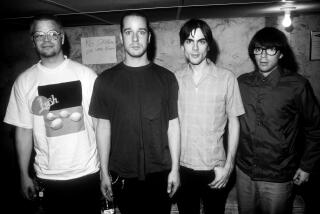Jethro Tull “Stand Up” (1969)<i> Chrysalis </i>
- Share via
Jethro Tull’s sophomore effort found the group in a transitional stage. The band was still steeped in the jazz influence that made its “This Was” one of the more auspicious debut albums of the late ‘60s, and now the band was beginning to assimilate classical, ethnic, Euro-folk and metal sounds into the mix.
This early eclectic experimentation added up to crisp, smart rock ‘n’ roll that still sounds vital and inspired a quarter of a century later. With Martin Barre replacing Mick Abrahams on guitar, Ian Anderson emerged as Tull’s undisputed leader and creative force, his aggressive but refined flute- playing and often overbearing personality now at the fore.
Anderson’s legendary ego and ambition would come to be the group’s artistic (if not commercial) ruin in a few years, but here, his compositions, musicianship and vision are more controlled and ultimately more exciting than on his grandiose projects of the ‘70s. “A New Day Yesterday,” “Nothing Is Easy” and “For a Thousand Mothers” are tastefully executed, hook-laden hard rockers. The instrumental “Bouree” is Bach-meets-Roland Kirk. “Jeffery Goes to Leicester Square” and “Fat Man” (a nasty jab at Abrahams) use raga-influenced melodies and instrumentation.
An impressive and expressive explosion of disparate sounds, “Stand Up” stands out as Tull’s finest hour.
More to Read
The biggest entertainment stories
Get our big stories about Hollywood, film, television, music, arts, culture and more right in your inbox as soon as they publish.
You may occasionally receive promotional content from the Los Angeles Times.









